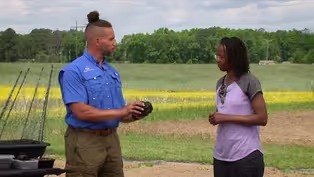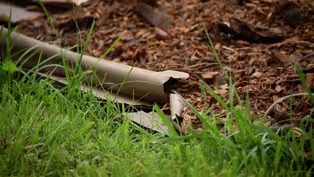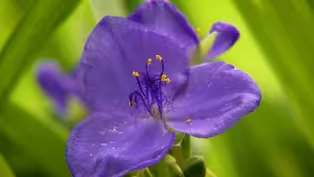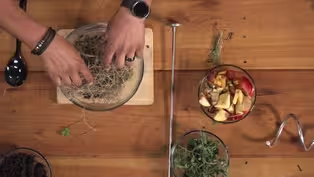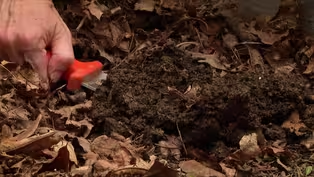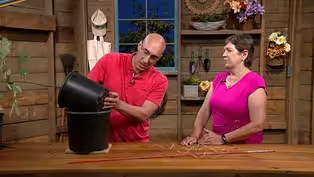Virginia Home Grown
Transforming a traditional landscape
Clip: Season 24 Episode 3 | 7m 53sVideo has Closed Captions
Adding native plants, reducing runoff, and improving soil creates an eco-friendly garden
Peggy Singlemann visits Richmond meteorologist, Andrew Freiden, to talk about his efforts to convert a traditional landscape into a more healthy and sustainable environment. Featured on VHG episode 2403; May 2024.
Problems playing video? | Closed Captioning Feedback
Problems playing video? | Closed Captioning Feedback
Virginia Home Grown is a local public television program presented by VPM
Virginia Home Grown
Transforming a traditional landscape
Clip: Season 24 Episode 3 | 7m 53sVideo has Closed Captions
Peggy Singlemann visits Richmond meteorologist, Andrew Freiden, to talk about his efforts to convert a traditional landscape into a more healthy and sustainable environment. Featured on VHG episode 2403; May 2024.
Problems playing video? | Closed Captioning Feedback
How to Watch Virginia Home Grown
Virginia Home Grown is available to stream on pbs.org and the free PBS App, available on iPhone, Apple TV, Android TV, Android smartphones, Amazon Fire TV, Amazon Fire Tablet, Roku, Samsung Smart TV, and Vizio.
Providing Support for PBS.org
Learn Moreabout PBS online sponsorship>>You don't have what I would call a typical front yard.
>>Yeah, it's a front yard that used to be a typical front yard, then we moved in and things started going downhill.
(Peggy laughing) Although, I think uphill.
>>I wouldn't say downhill.
>>Yes!
Right?
(Peggy laughing) We've made some choices that aren't normal.
There's a couple fruit trees, these are persimmon trees in the front.
But we started out, we cut out some big long beds and we put wildflowers in, and it worked wonderfully.
It attracted butterflies immediately, and pollinators.
>>Wonderful.
>>And neighbors, like people are like, "What's goin' on in your front yard?"
And so, the other day, my wife cut some flowers and gave 'em to like a 3-year-old girl who was ridin' a bike with her dad.
And so we're talking and we're meeting people.
And I love lookin' at the front yard and seeing stuff producing instead of just being grass.
>>Yes, it's so much fun, including the vegetables I see that you have.
>>My daughter made these raised beds.
>>Ooh, great.
>>Old pallets, not treated, it was all natural stuff.
>>Right.
>>And she did it for a project.
And so, this is our vegetable garden, and vegetable gardens doesn't really work for me entirely 'cause it's work.
>>Yes.
>>Ask your gardener friends around the corner, they're working.
(Peggy laughing) And so, I like the stuff that we put in, and once you get it started, it's like, "We got this, leave us alone.
We'll live here just fine."
That's my plan.
>>Well, like your berries.
>>Yeah.
Blackberries, raspberries, and they are vigorous and they're happy.
This is their second year, we got a few berries last year.
We anticipate this year, they're primocane, so the new growth produces the berries.
There's some blossoms already.
>>Right.
>>But how cool is it to, instead of having grass, have a spot where your kids will come out and pick berries and eat them.
>>Fresh berries.
>>And I don't have to worry about them spreading.
People say, "Well, you're gonna have raspberries all in the front yard," well no, because I have turf that I'm cutting with the mower.
So anything that sprouts up just gets cut down- >>Gets cut back down.
>>It stays where it's supposed to be.
>>Speaking of turf, I see you've allowed the weeds, what we would call weeds- >>Hey!
How dare you.
>>The other plants move in.
Yes.
(laughing) >>I've heard you say that weeds are just plants somewhere where you don't want them.
>>Exactly.
>>So, I like these.
I want 'em here, I don't think they're weeds.
Clover, violet, they're all here.
>>I think it's fantastic.
>>Yeah.
>>Because what it does, it makes that lawn a little bit more diverse.
And the pollinators, they're able to come to your lawn.
Really, you're just adding to the biodiversity.
>>Yeah, so it's cool.
And it also, again the cheap and lazy part of me, I'm not paying to kill them.
So it doesn't look, as some people would say, "perfect."
>>Right.
>>But to me, it looks absolutely perfect.
It's growing and I'm not doing anything to it other than mowing it.
And I kinda hate mowing too, but that's a different story.
But, I'd love to cut more... Hopefully, you come back in a few years and there's more beds and less turf grass.
>>That would be great.
I love the fact that you're leaving things for even our pollinators.
>>Sometimes when I'm mowing and there's a really vigorous patch of clover with the white blooms on it and there's bees on it, I'm like, "Oh okay, I'll go around you.
I'll get ya next time."
>>Right.
>>Yeah.
>>It's okay, be a little flexible.
>>Yeah.
>>But I like your walkway too.
>>Oh yeah, this used to be an enormous curved asphalt driveway.
>>Oh my.
>>And one of the first things we did when we moved in here was like, "This thing is gonna take a lot of maintenance, I think we gotta get rid of this thing."
And so we got some money, some help from VCAP, Virginia Conservation Assistance Program, for the cost that it was to take that out and to put this walkway in.
>>That's fantastic.
Yes.
And the walkway you put in is bricks set in sand.
So that's permeable, so when it rains, the water goes down and replenishes our groundwater which is what we need.
>>Yes, it stays here, it doesn't leave.
And speaking of staying here and not leaving, I don't want anything to leave.
All the resources that hit here, the sun, the water, I'd like it to stay on here.
And I think of the leaves as a resource too.
So we have these big trees and they drop leaves all over the place, and I hate seeing people take the leaves and bag 'em up, or suck them up, or put 'em out on the street and get 'em outta here.
There's all that good stuff in those leaves.
>>So many nutrients.
>>Yes, so I'm like, "I'm keepin' it."
So I keep every leaf on the property, that's my plan.
>>Well, I noticed a compost pile in the back.
>>Oh yeah, some leaves.
>>Let's go take a look.
>>Let's check it out.
(birds chirping) Is anybody's compost pile pretty?
I mean, ours isn't very pretty, but we're keepin' the stuff here, that's the goal.
>>Yes, you're keepin' it here and you're workin' with it, and you're letting all those wonderful biological fungi do their job.
>>And it's not too far from our frog pond, which is like my favorite thing in our backyard.
>>And what a great frog pond you have.
>>Thank you, and I appreciate it.
I mean, we worked pretty hard on it, it was a lotta digging.
>>You showed me the photos, how deep you dug this.
(laughing) >>Yeah, so they say when you make it, you have to make it pretty deep in the middle to allow some frogs to overwinter.
You can hear the frogs there.
>>Yes.
>>That's a green frog, I'm pretty sure.
>>Okay.
>>But they're down in the middle and the middle's deep, and then there's a shelf on the outside.
>>Yes, which also allow the birds to come and bird bath.
>>Oh my gosh, I wish they were here.
I think we scared them away, but this is the prime spot where the neighborhood birds come to get clean or to play, I don't know what they're doin'.
But that's been an added bonus that we didn't think was gonna happen, is that all these birds were gonna come in here and visit all the time.
>>And I applaud you for using the rainwater off of your roof to fill your frog pond.
>>So it was a little bit of an elevation issue to figure out how to do it.
>>Yes.
>>So we had to build a little hill, but we've run a PVC pipe that goes from one section of our roof right into the frog pond.
So, it has to get really hot and really dry in the summer for us to get the hose out.
(frog honking) I know.
(laughing) >>What a ham.
(Peggy and Andrew laughing) >>Somebody's even more of a camera hog than I am.
Do you mind stepping aside so I can get set?
(Peggy laughing) But the fact that that, unless it's really hot and dry, it stays pretty full.
Like every time it rains, it just fills up.
And so it's been a nice addition to the yard and I think it's easier than people think, I encourage ya to look it up.
>>Yeah.
>>"Hey, could I put a frog pond, or at least a rain garden in my backyard?"
It's a pretty cool thing.
>>And those are two different things 'cause this has a liner, so it holds water.
Where a rain garden does not have a liner, it's shallow, more like a crater, and it has soil in it to improve the percolation of the water down into the water table.
And most times, rain gardens are dry, they're only wet when it rains.
>>Yeah, and that one, I don't think you have to worry too much about mosquitoes.
In this case, we do have to worry, so we treat them with these mosquito bits which are pretty decent, they're not like a horrible thing.
And you put it in there to make sure the mosquitoes aren't taken off in here.
>>Yes, it's just Bacillus thuringiensis, I use 'em all the time.
>>That's what I was gonna say, but okay, if you wanna... (Andrew and Peggy laughing) It's so fun to hang out with you 'cause I have no idea if you were totally making this up, but I'm gonna Google it later, okay?
>>You do that.
(Peggy and Andrew continue laughing) But also, Andrew, I applaud you because you purchased a house with a very, I'll say traditional landscape.
>>Yes.
>>People planted what were popular.
But now as you're moving through it, you're kind of infusing those native plants.
>>Yeah, we're doing our best to take out what we can and put in what should be here.
And so you've been very kind, and when you say traditional plants, I hear you say invasive non-natives that shouldn't be here.
And I feel it and I know it, and every time we're out and I look, I go, "Oh, that lily, right, shouldn't be there.
Let's get rid of it."
And you said, I have a great alternative, like right over there, that purple stuff.
>>Yes, you've got spiderwort, or spider lily, depending on the common name.
But it's Tradescantia, and it's native here to Virginia.
>>And when am I gonna split that up?
>>You can split that up in the fall, or you can just let it go to seed and sprinkle the seed.
>>Alright, I'll do that.
And then when I knew you were coming to visit, I'm like, "Peggy Singlemann is coming to my yard to judge me."
>>(laughing) No, I'm not.
>>You know, (laughing) it's like if a Picasso was coming to look at my finger paintings, right?
I'd be like, "Uh, this is gonna be a tough day for me."
But, I'm trying to embrace like gardening or taking care of your property isn't one prize at the end.
>>Yeah.
>>I'm getting little successes and little prizes along the way.
It's not like it has to be perfect, those little steps every year can move you toward a better garden.
>>Exactly, and it's the holistic picture we're looking for.
>>Yeah.
>>And if it takes just a few more years than you thought, or 10 years, but you're still making your way toward that goal.
Well thank you, Andrew, for kindly showing us your place and the work you're doing one step at a time.
>>Alright, I appreciate it.
Also, I'd like to say, thanks guys for on cue making frog noises.
Those are our green frogs of the Freiden family.
(frog croaking)
Video has Closed Captions
Clip: S24 Ep3 | 8m 40s | Learn about a amendment made with activated charcoal to improve soil health and structure (8m 40s)
Cardboard for suppressing weeds
Video has Closed Captions
Clip: S24 Ep3 | 2m 48s | Create a weed barrier in your garden by reusing cardboard packaging (2m 48s)
Video has Closed Captions
Clip: S24 Ep3 | 26m 46s | Healthy gardens are more than plants! (26m 46s)
Video has Closed Captions
Clip: S24 Ep3 | 6m 42s | How to make your own compost at home (6m 42s)
Video has Closed Captions
Clip: S24 Ep3 | 3m 23s | Maintain soft and fertile soil in raised bed gardens (3m 23s)
Video has Closed Captions
Clip: S24 Ep3 | 6m 18s | How to pot up a young tree and encourage vertical growth (6m 18s)
Providing Support for PBS.org
Learn Moreabout PBS online sponsorship

- Home and How To

Hit the road in a classic car for a tour through Great Britain with two antiques experts.












Support for PBS provided by:
Virginia Home Grown is a local public television program presented by VPM
